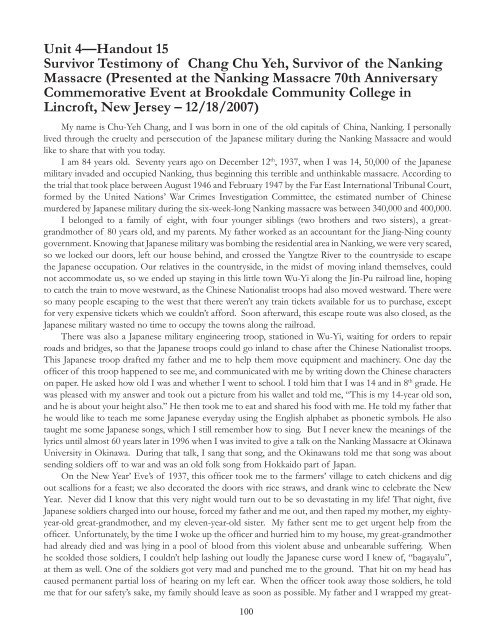Download - Canada ALPHA
Download - Canada ALPHA
Download - Canada ALPHA
You also want an ePaper? Increase the reach of your titles
YUMPU automatically turns print PDFs into web optimized ePapers that Google loves.
Unit 4—Handout 15<br />
Survivor Testimony of Chang Chu Yeh, Survivor of the Nanking<br />
Massacre (Presented at the Nanking Massacre 70th Anniversary<br />
Commemorative Event at Brookdale Community College in<br />
Lincroft, New Jersey – 12/18/2007)<br />
My name is Chu-Yeh Chang, and I was born in one of the old capitals of China, Nanking. I personally<br />
lived through the cruelty and persecution of the Japanese military during the Nanking Massacre and would<br />
like to share that with you today.<br />
I am 84 years old. Seventy years ago on December 12 th , 1937, when I was 14, 50,000 of the Japanese<br />
military invaded and occupied Nanking, thus beginning this terrible and unthinkable massacre. According to<br />
the trial that took place between August 1946 and February 1947 by the Far East International Tribunal Court,<br />
formed by the United Nations’ War Crimes Investigation Committee, the estimated number of Chinese<br />
murdered by Japanese military during the six-week-long Nanking massacre was between 340,000 and 400,000.<br />
I belonged to a family of eight, with four younger siblings (two brothers and two sisters), a greatgrandmother<br />
of 80 years old, and my parents. My father worked as an accountant for the Jiang-Ning county<br />
government. Knowing that Japanese military was bombing the residential area in Nanking, we were very scared,<br />
so we locked our doors, left our house behind, and crossed the Yangtze River to the countryside to escape<br />
the Japanese occupation. Our relatives in the countryside, in the midst of moving inland themselves, could<br />
not accommodate us, so we ended up staying in this little town Wu-Yi along the Jin-Pu railroad line, hoping<br />
to catch the train to move westward, as the Chinese Nationalist troops had also moved westward. There were<br />
so many people escaping to the west that there weren’t any train tickets available for us to purchase, except<br />
for very expensive tickets which we couldn’t afford. Soon afterward, this escape route was also closed, as the<br />
Japanese military wasted no time to occupy the towns along the railroad.<br />
There was also a Japanese military engineering troop, stationed in Wu-Yi, waiting for orders to repair<br />
roads and bridges, so that the Japanese troops could go inland to chase after the Chinese Nationalist troops.<br />
This Japanese troop drafted my father and me to help them move equipment and machinery. One day the<br />
offi cer of this troop happened to see me, and communicated with me by writing down the Chinese characters<br />
on paper. He asked how old I was and whether I went to school. I told him that I was 14 and in 8 th grade. He<br />
was pleased with my answer and took out a picture from his wallet and told me, “This is my 14-year old son,<br />
and he is about your height also.” He then took me to eat and shared his food with me. He told my father that<br />
he would like to teach me some Japanese everyday using the English alphabet as phonetic symbols. He also<br />
taught me some Japanese songs, which I still remember how to sing. But I never knew the meanings of the<br />
lyrics until almost 60 years later in 1996 when I was invited to give a talk on the Nanking Massacre at Okinawa<br />
University in Okinawa. During that talk, I sang that song, and the Okinawans told me that song was about<br />
sending soldiers off to war and was an old folk song from Hokkaido part of Japan.<br />
On the New Year’ Eve’s of 1937, this offi cer took me to the farmers’ village to catch chickens and dig<br />
out scallions for a feast; we also decorated the doors with rice straws, and drank wine to celebrate the New<br />
Year. Never did I know that this very night would turn out to be so devastating in my life! That night, fi ve<br />
Japanese soldiers charged into our house, forced my father and me out, and then raped my mother, my eightyyear-old<br />
great-grandmother, and my eleven-year-old sister. My father sent me to get urgent help from the<br />
offi cer. Unfortunately, by the time I woke up the offi cer and hurried him to my house, my great-grandmother<br />
had already died and was lying in a pool of blood from this violent abuse and unbearable suffering. When<br />
he scolded those soldiers, I couldn’t help lashing out loudly the Japanese curse word I knew of, “bagayalu”,<br />
at them as well. One of the soldiers got very mad and punched me to the ground. That hit on my head has<br />
caused permanent partial loss of hearing on my left ear. When the offi cer took away those soldiers, he told<br />
me that for our safety’s sake, my family should leave as soon as possible. My father and I wrapped my great-<br />
100


